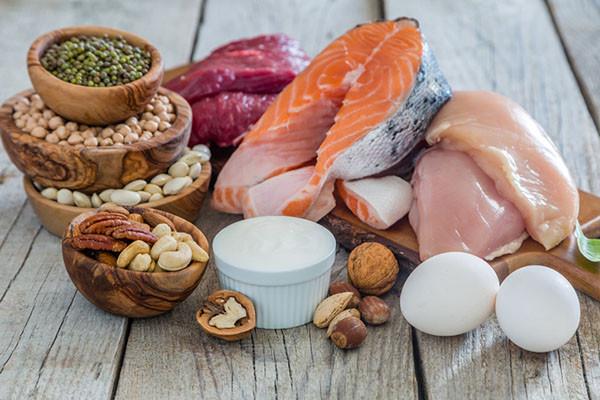Building muscle is a journey that extends beyond the gym and into the kitchen. Achieving maximum muscle growth requires more than just lifting weights; it demands a strategic approach to nutrition. Planning your meals effectively can be the secret weapon that propels you toward your fitness goals. In this article, we’ll guide you through the essential steps to create a meal plan tailored for muscle growth. From selecting the right macronutrients to timing your meals for optimal results, you’ll learn how to fuel your body for strength and performance. Whether you’re a seasoned athlete or just starting your fitness journey, these insights will empower you to harness the full potential of your diet and transform your physique. Let’s delve into the world of meal planning for muscle growth and unlock the power of nutrition.
Understanding Macronutrients for Muscle Gain
To effectively fuel muscle growth, it’s crucial to understand the role of macronutrients in your diet. Macronutrients, which include proteins, carbohydrates, and fats, each play a unique part in muscle development and recovery. Proteins are the building blocks of muscle tissue. Prioritize high-quality sources such as lean meats, fish, eggs, and plant-based options like lentils and chickpeas. Aim to include a source of protein in every meal to support continuous muscle repair and growth.
Carbohydrates are equally important as they provide the energy needed for intense workouts. Opt for complex carbohydrates like whole grains, oats, and sweet potatoes to maintain steady energy levels throughout the day. Meanwhile, fats should not be overlooked, as they are vital for hormone production and overall health. Incorporate healthy fats such as avocados, nuts, and olive oil into your diet. To optimize muscle gain, balance your macronutrient intake by focusing on:
- Consuming protein-rich foods with every meal
- Including complex carbohydrates to fuel workouts
- Adding healthy fats for essential nutrient absorption

Creating a Balanced Meal Plan with Protein-Rich Foods
Building a meal plan that supports muscle growth requires a strategic focus on protein-rich foods. These foods are the cornerstone of muscle repair and growth, and integrating them into your diet can significantly boost your fitness goals. Consider incorporating a variety of protein sources to ensure you receive all essential amino acids. Here’s how you can balance your meals:
- Lean Meats: Opt for chicken, turkey, and lean cuts of beef, which are high in protein and low in saturated fats.
- Plant-Based Proteins: Include beans, lentils, chickpeas, and quinoa for a nutrient-dense, protein-packed option that’s also rich in fiber.
- Dairy and Eggs: Greek yogurt, cottage cheese, and eggs are excellent sources of protein that also provide calcium and vitamin D.
- Seafood: Fish like salmon and tuna not only offer high protein but also provide omega-3 fatty acids, which are beneficial for heart health.
Balance these protein sources with complex carbohydrates and healthy fats to create a well-rounded meal plan. Incorporating a variety of colorful vegetables will provide essential vitamins and minerals that support overall health and muscle recovery. Remember, consistency is key, and with a well-structured plan, you can maximize your muscle growth effectively.

Timing Your Meals for Optimal Muscle Recovery
To harness the full potential of your workouts, it’s crucial to strategically time your meals around your exercise schedule. Consuming the right nutrients at the right times can significantly enhance muscle recovery and growth. Pre-workout meals should be consumed about 1-3 hours before exercising and should include a balance of carbohydrates and protein to fuel your session and minimize muscle breakdown. Consider options like:
- Oatmeal with a scoop of protein powder
- Grilled chicken with sweet potatoes
- Whole grain toast with almond butter and banana slices
Equally important is the post-workout meal, which should be consumed within 30-60 minutes after your workout to replenish glycogen stores and kickstart muscle repair. Aim for a combination of fast-digesting carbs and high-quality protein. Some ideal choices are:
- Protein shake with a banana
- Greek yogurt with honey and berries
- Egg omelet with spinach and whole grain toast
By aligning your meal timing with your workout schedule, you ensure your muscles receive the nutrients they need precisely when they need them, promoting faster recovery and maximizing growth potential.
Incorporating Supplements to Enhance Muscle Growth
While whole foods should be the cornerstone of your muscle-building diet, strategically incorporating supplements can provide that extra edge in your journey to peak physical performance. Protein powders, such as whey or plant-based options, are a convenient way to ensure you’re meeting your daily protein requirements, especially post-workout when your muscles are most receptive to nutrients. Creatine, another well-researched supplement, can enhance strength and increase lean muscle mass by improving your ability to produce energy rapidly during intense activities.
- Branched-Chain Amino Acids (BCAAs): These essential amino acids can help reduce muscle soreness and accelerate recovery, making them a valuable addition during intense training periods.
- Beta-Alanine: This amino acid can improve performance by buffering acid in muscles, delaying fatigue, and allowing for more intense training sessions.
- Omega-3 Fatty Acids: Often overlooked, these can support muscle protein synthesis and reduce inflammation, aiding in recovery and growth.
When selecting supplements, ensure they are high-quality and tested for purity. Always consult with a healthcare provider or nutritionist to tailor these to your specific needs and goals, as individual requirements can vary. By smartly integrating supplements with your well-balanced meals, you can significantly amplify your muscle growth efforts.




